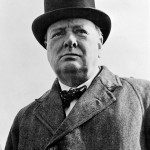Recently, thanks to Elizabeth Scalia’s piece on Winston Churchill, I got to thinking. Leadership really matters. Seventy five years ago, on September 1st, the most destructive war in human history began. And it began with a strategy called “Lightning War”. The German Army under the rabid leadership of Adolf Hitler and his National Socialist state raced into and crushed the valiant, but overwhelmed Polish Army in a matter of weeks. Poland, trapped between the two unparalleled despotisms of National Socialism and Soviet Communism, waited upon the promised assistance from the United Kingdom: a promise ratified only days before in the Anglo-Polish Agreement of Mutual Assistance should either be attacked by another European country. And so one day would pass after the initial German attack, then two. The United Kingdom, under Prime Minister Neville Chamberlain, issued an ultimatum to the German state. Suspend aggressive actions and withdraw troops from Poland by 11 a.m. on September 3rd or consider yourself at war with the United Kingdom. The hour would pass. And war would ensue. But a few clarifications need to be made. A war of a different kind began years before the official beginning of World War II on September 1, 1939. Adolf Hitler, taking notes from the effectively unchecked aggression of “Il Duce” Mussolini’s invasion of Abyssinia, decided to try his hand at “bloodless conquest”. “Bloodless conquest” went something like this: Identify a region you are interested in, articulate a fabricated injustice perpetuated in said region that “only you are able to rectify” (ill-treated Germanic minorities in the Rhineland, Austria or the Czech Sudetenland), foment unrest in the region as a provocation for you to act, invade swiftly and cover your tracks with concessions of peace and cooperation that give the impression that you are being reasonable and allow a face-saving excuse for those who feel they ought to confront you. And, Voila!, you have acquired new territory. Conquest that is bloodless. It was Hitler’s specialty. And it worked in the Rhineland (a demilitarized buffer zone since World War I between Germany and France) (1936), Austria (1938) and Czechoslovakia (1938-39). What did Prime Minister Stanley Baldwin say about the anemic British military and the lack of coherent response to Germany’s 1936 occupation of the Rhineland, a clear violation of the Versailles and Locarno treaties?
“Supposing I had gone to the country and said that Germany was rearming and we must rearm, does anybody think that this pacific democracy would have rallied to that cry at that moment! I cannot think of anything that would have made the loss of the election from my point of view more certain…”
And what did Conservative Member of Parliament Winston Churchill have to say about this British lack of rearmament in the face of brazen Nazi aggression?
“The Government simply cannot make up their minds, or they cannot get the Prime Minister to make up his mind. So they go on in strange paradox, decided only to be undecided, resolved to be irresolute, adamant for drift, solid for fluidity, all-powerful to be impotent. So we go on preparing more months and years – precious, perhaps vital to the greatness of Britain – for the locusts to eat.”
In 1938, when Nazi forces marched into Austria to throngs of locally whipped-up adulation, Prime Minster Neville Chamberlain spoke through pursed lips,
“The hard fact is – and of its truth every honorable Member can judge for himself – that nothing could have arrested this action by Germany unless we and others with us had been prepared to use force to prevent it. I imagine that according to the temperament of the individual the events which are in our minds today will be the cause of regret, of sorrow, perhaps of indignation.”
Winston Churchill, meanwhile, would warn,
“Europe is confronted with a program of aggression, nicely calculated and timed, unfolding stage by stage, and there is only one choice open, not only to us, but to other countries who are unfortunately concerned – either to submit, like Austria, or else to take effective measures while time remains to ward off the danger and, if it cannot be warded off, to cope with it…If we were to delay [resistance], if we were to go on waiting upon events for a considerable period, how much should we throw away of resources which are now available for our security and for the maintenance of peace? How many friends would be alienated, how many potential allies should we see go, one by one, down the grisly gulf, how many times would bluff succeed, until behind bluff ever-gathering forces had accumulated reality?…[In sum], let those who wish to reject [organized alliance and resistance] ponder well and earnestly upon what will happen to us if, when all else has been thrown to the wolves, we are left to face our fate alone.”
In late September, 1938 the infamous Munich Pact was signed by a Adolf Hitler, Benito Mussolini, French Premier Edouard Daladier and a beaming Neville Chamberlain. The agreement surrendered the steeply fortified Sudetenland (Western Czechoslovakia) to Hitler’s growing empire. The Czechs were not allowed to even attend the meeting so fateful to their existence and were brusquely forced into accepting its terms. Prior to the meeting, Chamberlain would lament,
“How horrible, fantastic, incredible it is that we should be digging trenches and trying on gas-masks here [in England] because of a quarrel in a far-away country between people of whom we know nothing. It seems still more impossible that a quarrel that has already been settled in principle should be the subject of war.”
And then he would return with the signed agreement – which dismembered a once-free state and fed it to a ravenous despot – greeting adoring crowds and declaring,
“I believe it is peace for our time.”
After this display, Churchill would acerbically scowl,
“I will, therefore, begin by saying the most unpopular and most unwelcome thing. I will begin by saying what everybody would like to ignore or forget but which must nevertheless be stated, namely, that we have sustained a total and unmitigated defeat.”
“You were given the choice between war and dishonor. You chose dishonor and you will have war.”
When war finally broke out, a despondent Chamberlain ruefully spoke,
“You can imagine what a bitter blow it is to me that all my long struggle to win peace has failed. Yet I cannot believe that there is anything more or anything different that I could have done and that would have been more successful.”
While Churchill fiercely rallied,
“The Prime Minister said it was a sad day, and that is indeed true, but at the present time there is another note which may be present, and that is a feeling of thankfulness that, if these great trials were to come upon our Island, there is a generation of Britons here now ready to prove itself not unworthy of the days of yore and not unworthy of those great men, the fathers of our land, who laid the foundations of our laws and shaped the greatness of our country…
We are fighting to save the whole world from the pestilence of Nazi tyranny and in defense of all that is most sacred to man. This is no war of domination or imperial aggrandizement or material gain; no war to shut any country out of its sunlight and means of progress. It is a war, viewed in its inherent quality, to establish, on impregnable rocks, the rights of the individual, and it is a war to establish and revive the stature of man.”
As one bright historian noted, “While Chamberlain was wringing his hands, Churchill was shaking his fist.”
What must we remember? What must we learn from all of this?
Sometimes – no, at all times – it is vital that we know what we believe in. Sometimes – no, at all times – we must get up after we fall. Sometimes – no, at all times – we must defend what we believe in. These three things we must never forget.
And if we do forget, someone must remind us.
Leadership matters.
Doesn’t it?











